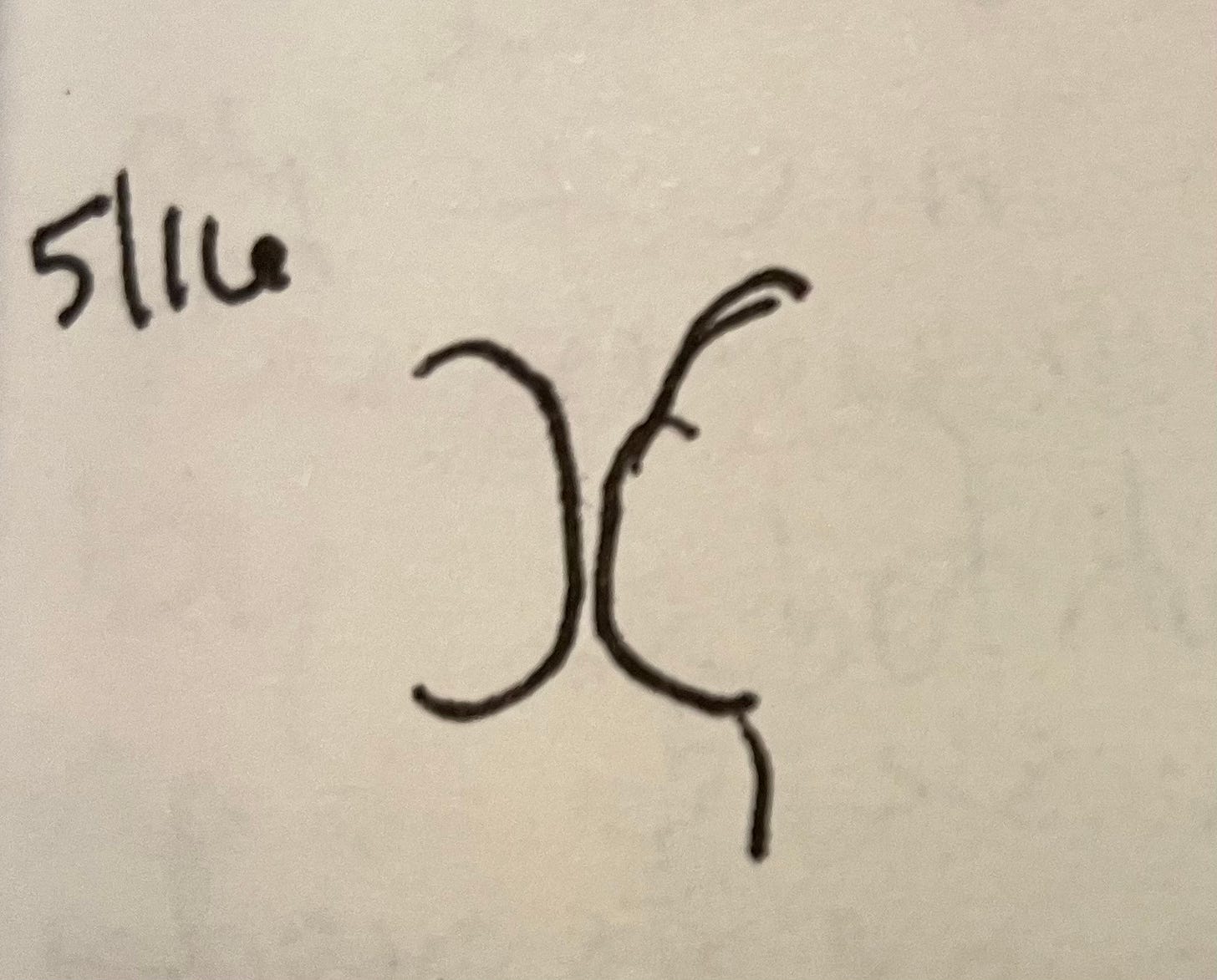Writing By Drawing + Commencement Speeches & Considering Switchback Memories
with inspiration from Lynda Barry, Jesmyn Ward, & Alice Munro
Hi friend,
Soon, we will put pen to paper. If you would like to write or draw, I invite you to get something you like to draw with—pen or pencil and an unlined piece of paper. The prompt today begins in drawing and then moves outward into words.
But first, how has your week been? I’m revising this letter to you at a Walgreens clinic because one of my kids passed on strep to me for the fourth time this year and the other is home from school with a tummy ache, also likely strep.
In better news, I was invited to give the commencement speech at Regis University’s MFA graduation ceremony in Colorado soon. So this week, before saying yes, I noodled around with what I *might* say and realized that writing words of encouragement, tempered by acknowledgment of difficulties, is what I love to do, and is what I do here, in this newsletter, but also as my job as a professor–it feels to me like the greatest gift we can give one another is the belief we have in other people making things, in their projects and in their progress. I also looked to see what other writers have said, finding a provocative piece about how Wallace’s famous speech is bad for literature, and Saunders’ classic about how his biggest regrets are failures of kindness, and Jesmyn Ward’s speech, a moving personal narrative of how she reconsidered her elders’ choices and life in light of a personal tragedy and how the pursuit of writing took much longer than she might have imagined. (She says she is no Zadie Smith but I think it took her like three years to revise her thesis and turn it into a book, which is relatively fast! Some of us—ahem—have yet to publish our thesis. Though, the themes of that book, for me, are everywhere in the books and essays I later published.)
Garth Greenwell’s speech comments upon the genre and then fulfills the genre expectations, which is also a classic move of the genre: “It’s traditional, I think, at this point in this kind of address, to offer something like advice. I feel a little fraudulent doing that since I don’t think advice often helps much; I think every artist makes it up as they go along. But here are seven very opinionated thoughts…”
All to say: I’m giving the speech in July and I’m thinking a lot about the genre and form.
I’m also waiting on notes from readers on a novel draft and I’m so happy they have not sent me their notes back yet because it feels as if I’m lying breezily in a hammock, momentarily not wasting my life, to quote a poem by James Wright, instead of feeling like I should be writing. (But I am writing a little, see above.)
Are you reading anything you love right now? Summer is comfort reading for me, often rereading. I’m looking again at Lynda Barry’s SYLLABUS that a then-MFA student and awesome writer Katy Shay told me about 6.5 years ago (Thanks, Katy!). As Barry recs, I’m drawing in a blank notebook, doing circles and lines and just getting back in contact with the part of myself I stopped cultivating when I stopped drawing as a child. It feels vulnerable and sweet and silly and alive to draw again, and I’m reminded of how my four-year-old son might feel, trying to write words for the first time. Back at soshin, beginner’s mind, as the meditators and Buddhists might say.
One assignment Lynda Barry gives in her drawing classes is to draw a car for two minutes. Another is to draw Batman in two minutes. Something in the time constraint pushes us to get down the essential and to not overthink or belabor. Perhaps, like writing, if we set a timer? Another drawing prompt is just to draw a spiral with the tiniest distance between the lines, as a way of getting, according to Barry, “the top of your mind and the back of your mind ready to work.” That one has been very calming to do before writing.
I am not, as you can see below, "good" at drawing. But there is something tender and vulnerable and good feeling about trying something we aren't good at, no? Barry says she loves the drawing by people that stopped long ago, and I feel something similar about people who start writing again after a long absence, folks that wanted to write once, a long time ago, and now they are just getting around to it. Their writing is beautiful because it has been expanded by all that life experience and it does not look like something, usually, that is trying to look like something else.
Lynda Barry says:
“Liking and not liking can make us blind to WHAT’S THERE. There is something beautiful in the lines made by people who stopped drawing a long time ago. And there is something curious about how scared they are…”

I also realized, for all those hours that amount to years spent describing what things look like and feel like and are, I do not know what a lot of basic things, like a car, actually look like. I mean, I know similes, but not actuals. To amend that, I’ve started looking at things as if I would draw them, and drawing them.
Here is Barry talking through the calming spiral exercise:
This week I also pulled The Artist’s Way off my shelf, which advocates for writing three handwritten pages each morning, about anything, and so now I guess I’m writing a visual daily journal? There are some things I feel, particularly in dreams, that I haven’t found the exact words for, related to nostalgia, and these “bad” drawings are doing something for me, recording a feeling. It reminds me of this line from Alice Munro’s short story, “Child’s Play”:
“Every year, when you’re a child, you become a different person.”
But then, we move forward, not looking back, until, one day, there is a switchback, a time later in life when one returns to those memories: “And then there's a switchback, what's been all over and done with sprouting up fresh, wanting attention, even wanting you to do something about it, though it's plain there is not on this earth a thing to be done.”
Sidenote here: Munro always shows us how that old adage “show don’t tell” is wrong. Her stories demonstrate how essential “telling” and exposition generally are in fiction!
This time of year, as the houses near me put out flags of where the eighteen-year-old inhabitants will go to college--on my block, Bowdoin and Carleton--and in my role as a professor, I've just celebrated with undergrads and MFA students as they move onward, to grad school, to first jobs, to the unknown, or those requisite gap years between the thesis draft and the first published book. This is the time of year for my annual switchback, as I return to being 24, or 19, or 18, back when my loyalties were month-to-month. Those switchbacks—the letter someone wrote to me I crumpled up that I wish I could look back at, the knock at the door I made my roommate answer, the things I said versus the things I thought and felt, that discrepancy of my younger self—is ever-present in what I recall about those years, alongside such gorgeous freefalling ecstatic joy and that is what I am writing & drawing into now.
What have you returned to in memory? Memories that come to you, unbidden? What are your switchbacks? Could you, for the objects and time and people you've passed—as if on an airport travelator (had to look up the name of that), heading in a separate direction from those people and objects of your past—draw them?
After starting this hybrid writing/drawing notebook, I woke a few days ago with a certain nostalgic feeling, sensation over narrative, that led me to draw instead of write, noodling around with a single line, then another, and it felt good, and the right medium for the feeling.
If you feel inclined, try drawing where and when you would usually try writing.
I love how unattached to commerce these drawings are. When I am drawing, I do not think, “Could this be in my novel"?” or “What mag might be interested in an extended essay version of this?” The drawing is for you or whomever you show it to. Notice if you feel self-judgment, then let it pass by like a cloud in the sky. There you are, judgment, and there you are, floating on by.
One more note about switchback memories, from Munro:
"…the time was coming very soon when all this would be over, the routines would be broken up, and we would be fetched by our parents to resume our old lives, and the counselors would go back to being ordinary people, not even teachers. We were living in a stage set about to be dismantled..."
Munro’s full story, if you'd like to read it.
Your Invitations to Write
PROMPTS
Keep reading with a 7-day free trial
Subscribe to TODAY YOU WILL WRITE to keep reading this post and get 7 days of free access to the full post archives.








